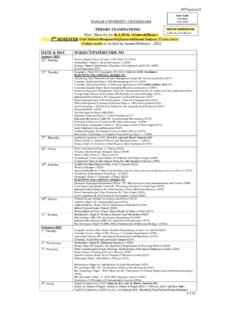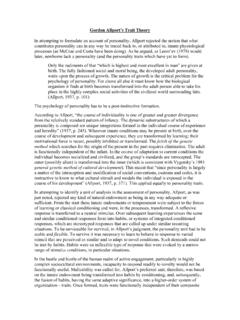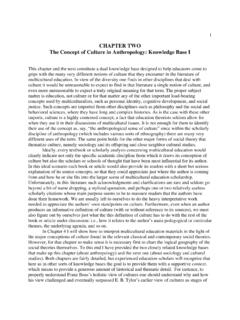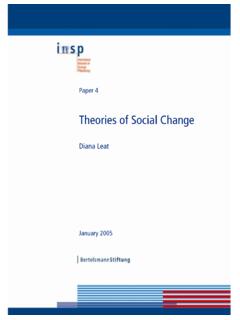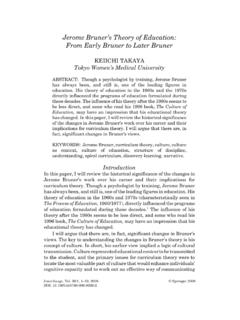Transcription of Study of the Bandura’s Social Cognitive Learning Theory ...
1 Social Sciences 2017; 6(1): 1-6 doi: ISSN: 2326-9863 (Print); ISSN: 2326-988X (Online) Review Article Study of the Bandura s Social Cognitive Learning Theory for the Entrepreneurship Learning Process Luluk Tri Harinie1, *, Achmad Sudiro2, Mintarti Rahayu2, Achmad Fatchan3 1 Department of Management, Economics and Bussiness Faculty, Palangka Raya University, Palangka Raya, Indonesia 2 Economics and Business Faculty, Brawijaya University, Malang, Indonesia 3 Mathematics and Natural Science Faculty, Malang State University, Malang, Indonesia Email address: (L. T. Harinie) *Corresponding author To cite this article: Luluk Tri Harinie, Achmad Sudiro, Mintarti Rahayu, Achmad Fatchan. Study of the Bandura s Social Cognitive Learning Theory for the Entrepreneurship Learning Process. Social Sciences.
2 Vol. 6, No. 1, 2017, pp. 1-6. doi: Received: January 4, 2017; Accepted: January 19, 2017; Published: February 23, 2017 Abstract: This paper aims to Study the Bandura s Social Cognitive Learning Theory as a basis for understanding the Learning process of entrepreneurship to foster individuals interest in entrepreneurship through family role model. Through this Study are expected to be able to observe the behavior of entrepreneurship displayed by models, and can add insight and knowledge in the entrepreneurship field. Bandura's Theory emphasizes the continuous reciprocal interaction between the factors of individuals behavior ( Cognitive ) and environmental influences in understanding Social Cognitive Learning process. Therefore, Learning in this Theory is more aimed at observational Learning and the process set of the four interrelated components: attentional processes, retention processes, motor reproduction processes, and motivational processes.
3 The fourth component is the one used in the process of entrepreneurship Learning to cultivate individuals interest in entrepreneurship. Keywords: Social Cognitive Learning Theory , Interest in Entrepreneurship, Attentional Processes, Retention Processes, Motor Reproduction Processes, Motivational Processes 1. Introduction In the process, human behavior is not an innate behavior. Psychologists argue that human behavior is formed as a result of the interaction of environmental factors, both external and internal environment. Therefore, the behavior of individuals is an activity that is also influenced by the external environment, as well as with the behavior of entrepreneurs. This behavior is not innate but are driven by the emergence of interest in starting entrepreneurs grow and develop in accordance with the factors that influence it.
4 This opinion was reinforced by Bygrave (2003) [7] who states that the decision to entrepreneurship growth is influenced by the result of the interaction between the personality traits of a person with his/her environment. Furthermore, the research results by Lambing and Kuehl (2007) [16] suggest that there are four elements that affect the decision to entrepreneurship, namely the behavior of individuals, cultural environment, Social conditions, and the combination of all three. But be aware that individual s behavior always has a certain background, focused on specific objectives, and has a relationship with the environment, so they can change if they relate to an individual effort to meet its needs in interaction with the environment. This is where individuals need to make the Learning process to acquire new behaviors in order to meet these needs.
5 The Learning process is very important for the development of the individual, where the individual will undergo a process to a better direction. Learning outcomes can be shaped in the form of behavioral changes in knowledge or skills, and mastery of the values of attitude. Furthermore, the Learning process in changing individuals behavior can be done through self-experience, learn from others, or learn from their surroundings. Bell (2015) [4] 2 Luluk Tri Harinie et al.: Study of the Bandura s Social Cognitive Learning Theory for the Entrepreneurship Learning Process believes that Learning process will be successful if it is implemented in the form of Learning activity. It means Learning experience itself or by doing exercises alone. This form of Learning activities is believed can improve individual s interest to do entrepreneurs and finally will behave entrepreneur.
6 Bell (2015) [4] also states that Learning from experience will provide an opportunity to develop entrepreneurial skills. Referring to what have been stated, implied the importance of the Learning process not only for the development of individual s behavior but also for growing interest in entrepreneurship. It is believed that more interest in entrepreneurship will appear if there is a stimulation of kin background in entrepreneurship as the earliest Social environment and may influence individual s attitudes to entrepreneurship, which in this case is a role model for entrepreneurship. Kuttim, et al. (2014) [15] state that having parental background in entrepreneurship is positively associate with the interest in entrepreneurship.
7 Kuttim et al opinion is supported by Hisrich, et al. (2005) [12] and Alma (2013) [1] who belive that family environment may effect the individual s interest in entrepreneurship. A successful entrepreneur may raised by parents who are also entrepreneurs, as have many extensive experiences in the business world (Duchesneau, et al., 1990) [11]. Family members not only facilitate business activities, but also provide manpower and affective support (Huei, et al., 2015) [14]. Bala and Nizam (2015) [3] show the role of parents as the closest individual s relatives affects business decision making in the family, where eventually can affect individual s behavior. Surya (2014) [22] also expressed that family is the earliest Social environment for individuals in providing significant influence for the development of the individual.
8 In addition, through the interaction of the older generation and the younger generation's involvement in the family continuesly on the business activities will transmit the culture of entrepreneurship from the older to the younger one (Cruz, et al., 2012) [9]. Many theories have discussed the Learning Theory , but this research will be more focused on the Social Cognitive Learning Theory of Bandura which associated with entrepreneurship Learning process for the interest in entrepreneurship as Study materials. There are two reasons why this Theory used in this research. First, this Theory is supported by research conducted by Boz and Ergeneli (2013) [5] who suggest that most entrepreneurial researchers use Bandura s Social Cognitive Learning Theory as a review of the literature, especially related to the family's role in shaping entrepreneurship interest of individuals, which in Theory the exhibited model s behavior is important to create interest and experience in enterpreneurship.
9 Second, this Theory is still rarely discussed in depth by researchers eventhough this Theory is very useful to add insight and knowledge for researchers in the field of entrepreneurship. 2. Bandura s Social Cognitive Learning Theory Actually, Learning Theory is a set of principles systematically and based reasoning is intended for a conceptual framework and have been tested empirically in providing an explanation and problem solving in the Learning phenomenon [20]. In this case, the Learning phenomenon in question is caused by changes in individual behavior in its interaction with the environment in an effort to meet the needs and achieve its objectives, so as to obtain a better quality of life and effective. Recognizing the importance of Learning for individuals, this Study refers to Bandura s Social Cognitive Learning Theory .
10 This Theory is an expansion of the flow of behaviorism and is considered relatively new compared to other Learning theories. Bandura uses the principles of classical conditioning and conditioning role in understanding the Learning by the individuals. In the next part of this research, we will discuss the basic principles and the lessons learned from this Theory . Basic Principles of Bandura s Social Cognitive Learning Theory Bandura s Social Cognitive Theory is an extension of the behaviorism Theory that emphasizes the importance of behavioral factors, environmental, and individual ( Cognitive ) in the Learning process [10], [8], [12]. Hjelle and Ziegler (1992) [13] state that the most important physiological functions and is believed to be understood in Bandura s Learning Theory is the emphasis on continuous reciprocal interaction between these three factors.

